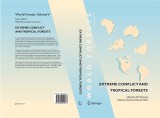Details

Extreme Conflict and Tropical Forests
World Forests, Band 5
|
96,29 € |
|
| Verlag: | Springer |
| Format: | |
| Veröffentl.: | 08.04.2007 |
| ISBN/EAN: | 9781402054624 |
| Sprache: | englisch |
| Anzahl Seiten: | 185 |
Dieses eBook enthält ein Wasserzeichen.
Beschreibungen
There are many compelling reasons for policymakers to pay more attention to forested regions and invest more resources there. Forests provide valuable products and en- ronmental services and several hundred million extremely poor people live near them. Perhaps the most compelling reason of all, however, is that unless policymakers take forest governance seriously and respond better to the needs of the people living there, these regions will continue to be breeding grounds for violent con?ict, banditry, and illicit crops. From Nicaragua’s Atlantic Coast to the jungles of Cambodia, there are several dozen countries around the world that have experienced severe breakdowns in law and order in their forested regions. In many of these cases those breakdowns had widespread economic, social, and political consequences that have threatened entire societies. You would think that after all of the suffering over the last few decades in the forested regions of Colombia, Peru, Mexico, Guatemala, the two Congo’s, Liberia, Mozambique, Philippines, Solomon Islands, Nepal, Angola, Rwanda, Nicaragua, Cote ˆ d’Ivoire, Myanmar, Bangladesh, India, Sri Lanka, Indonesia, Sierra Leone, Senegal, Sudan, Uganda, and Vietnam people would begin to take note. After all, they don’t call it jungle warfare for nothing.
TROPICAL FORESTS AND EXTREME CONFLICT.- BETWEEN WAR AND PEACE: VIOLENCE AND ACCOMMODATION IN THE CAMBODIAN LOGGING SECTOR.- GREED OR GRIEVANCE IN WEST AFRICA’S FOREST WARS?.- NICARAGUA’S FRONTIER: THE BOSAWAS BIOSPHERE RESERVE.- PAST CONFLICTS AND RESOURCE USE IN POSTWAR LAO PDR.- SEEING THE FOREST FOR THE TREES: TROPICAL FORESTS, THE STATE AND VIOLENT CONFLICT IN AFRICA.- CONFRONTING CONFLICT TIMBER.- ENVIRONMENTAL DAMAGE FROM ILLICIT DRUG CROPS IN COLOMBIA.- DEFOLIATION DURING THE VIETNAM WAR.- ADDRESSING EXTREME CONFLICTS THROUGH PEACE PARKS.
<P>At a time when the international community is devoting significant attention to the issue of governance as a key factor in global environmental decline, this book provides a timely insight into the relationships between extreme conflict, the international trade in forest products, and the social, economic and environmental condition of tropical forests and their human communities. </P>
<P></P>
<P>Drawing on the expertise of both natural and social scientists, <STRONG>Extreme Conflict and Tropical Forests</STRONG> explores the underlying causes and the social and environmental consequences of conflict in tropical forest areas. Case studies from Africa, Asia and Latin America present a range of issues – from illicit crops and ‘conflict timber’ production, to the potential of peace parks for improving human security, social quality and biodiversity conservation. </P>
<P></P>
<P>With implications for specific aspects of security, environment, development, forest policy and international relations, this book will be an important resource for both students and researchers exploring these issues – as well as a useful background for practitioners and policy makers working in these fields. </P>
<P></P>
<P>Drawing on the expertise of both natural and social scientists, <STRONG>Extreme Conflict and Tropical Forests</STRONG> explores the underlying causes and the social and environmental consequences of conflict in tropical forest areas. Case studies from Africa, Asia and Latin America present a range of issues – from illicit crops and ‘conflict timber’ production, to the potential of peace parks for improving human security, social quality and biodiversity conservation. </P>
<P></P>
<P>With implications for specific aspects of security, environment, development, forest policy and international relations, this book will be an important resource for both students and researchers exploring these issues – as well as a useful background for practitioners and policy makers working in these fields. </P>
Addresses the highly relevant issue of extreme conflict and links it to tropical forests Provides the most comprehensive compilations of themes and cases on this theme produced so far Has an analytical and academic approach, but provides many practical details that are relevant for practitioners and policy makers Essential reading material for students of natural resource disciplines Includes supplementary material: sn.pub/extras
<P>This book provides a timely insight into the relationships between extreme conflict, the international trade in forest products, and the social, economic and environmental condition of tropical forests and their human communities. It explores the underlying causes and the social and environmental consequences of conflict in tropical forest areas. Case studies from Africa, Asia, and Latin America present a range of issues, from illicit crops and "conflict timber" production, to the potential of peace parks for improving human security, social quality, and biodiversity conservation. With implications for specific aspects of security, environment, development, forest policy and international relations, this book will be an important resource for both students and researchers exploring these issues as well as a useful background for practitioners and policy makers working in these fields.</P>
Diese Produkte könnten Sie auch interessieren:

Inclusión educativa de niños, niñas y adolescentes migrantes venezolanos, en Colombia

von: Douglas Jiménez

15,99 €
















